




By Leo Adam Biga
Beauty industry professional, travel planner, tour guide, etiquette educator, influencer and host Mia Will lives her best life and helps others do the same. This “free spirit” divides her time between Omaha, where she ownsoperates Lash Goddess Spa, and Mexican resorts, where she rents her residential properties as vacation getaways. From lookin-feeling great to basking in sun-soaked, oceanside locales to taking in the sights she’s turned a pleasure-seeking lifestyle into a career that indulges a need to seek adventure and find harmony.
“I enjoy helping people enjoy their life whether it’s making them feel good through beauty treatments or introducing them to new places,” Will said. “We all love being taken care of. We all need a place to go where we can just shut out the rest of the world or any problems we might be having.”
Outside of a desire to travel and be her own boss, little of her life or career has been planned. “I just do what I love to do whether here in Omaha or in Mexico. I just kind of make it up as I go.”
As an only child she grew up

steeped in the beauty and garment businesses, which helps explain her passion for pampering and fashion. Her mother owned Sonia’s Salon in North Omaha and her
By Andy Bradley Contributing Writer
The call came from out of nowhere. Josh was distracted. He was driving his 2014 Toyota Camry with coffee in hand, late for work at his first job out of college. The caller ID on his smart phone reads, “Internal Revenue Service, Washington, DC.” What he heard next jolted him.
“I don’t really know anybody at that agency, but it seems like a call
that I should probably answer. So I do.
“I get on the phone with a man who has a thick accent, and he said, ‘Mr. Planos of Omaha, Nebraska? Who graduated from UNL?’
“He tells me his name is IRS Agent Frank Williams, and he reads off a badge number, and he informs me that I have unfortunately inaccurately filed my taxes. I owed about $5,000 to correct the situation.
“Agent Williams tells me, ‘Look, they’ve been trying to get a hold of me for months, so if I don’t agree to pay in the moment, he will have no choice but to arrest me for tax evasion.’
“I’m thinking about how I am running late for work. I’m thinking about the coffee that is spilling onto my hand. I’m thinking about how I’m going to have to explain this situation to my mom, who will
--Trust continued on page 8.
father supervised a manufacturing line at Pendleton Woolen Mills in Bellevue. With an appreciation for those things hard wired in her, she convinced her folks to let
her attend modeling school. Her mentor, the late Nancy Bounds of Omaha, trained men and women to become runway and print talents. Will became a proud graduate of the Bounds school. Exuding a Southern charm and bigger-than-life personality, Bounds was an exacting teacher, Will said, but gave students like herself the tools for success.
“I owe so much of my success as a woman to her. She was an amazing mentor and I will be forever grateful for the etiquette and poise she instilled in me at a young age. I learned so much. Years later I went back for a refresher course, then I ended up teaching for her agency.” Will did runway and print work for area department stores though she was too short for major runway shows like Ebony Fashion Fair. Besides modeling she organized fashion shows for her mom’s salon. She’s forever grateful for what Bounds did. “She’s a legend. I think the last time I saw Nancy it was at a nightclub downtown. She was still fabulous I went over to her and said you are responsible for every amazing thing that’s happened in my life.
--Will continued on page 9.

If you’re looking for local agencies seeking senior models and actors, you can try reaching out to agencies that actively promote diversity and represent a broad range of ages, which often features talent across different age groups. Learn more about modeling and acting on Page 16.

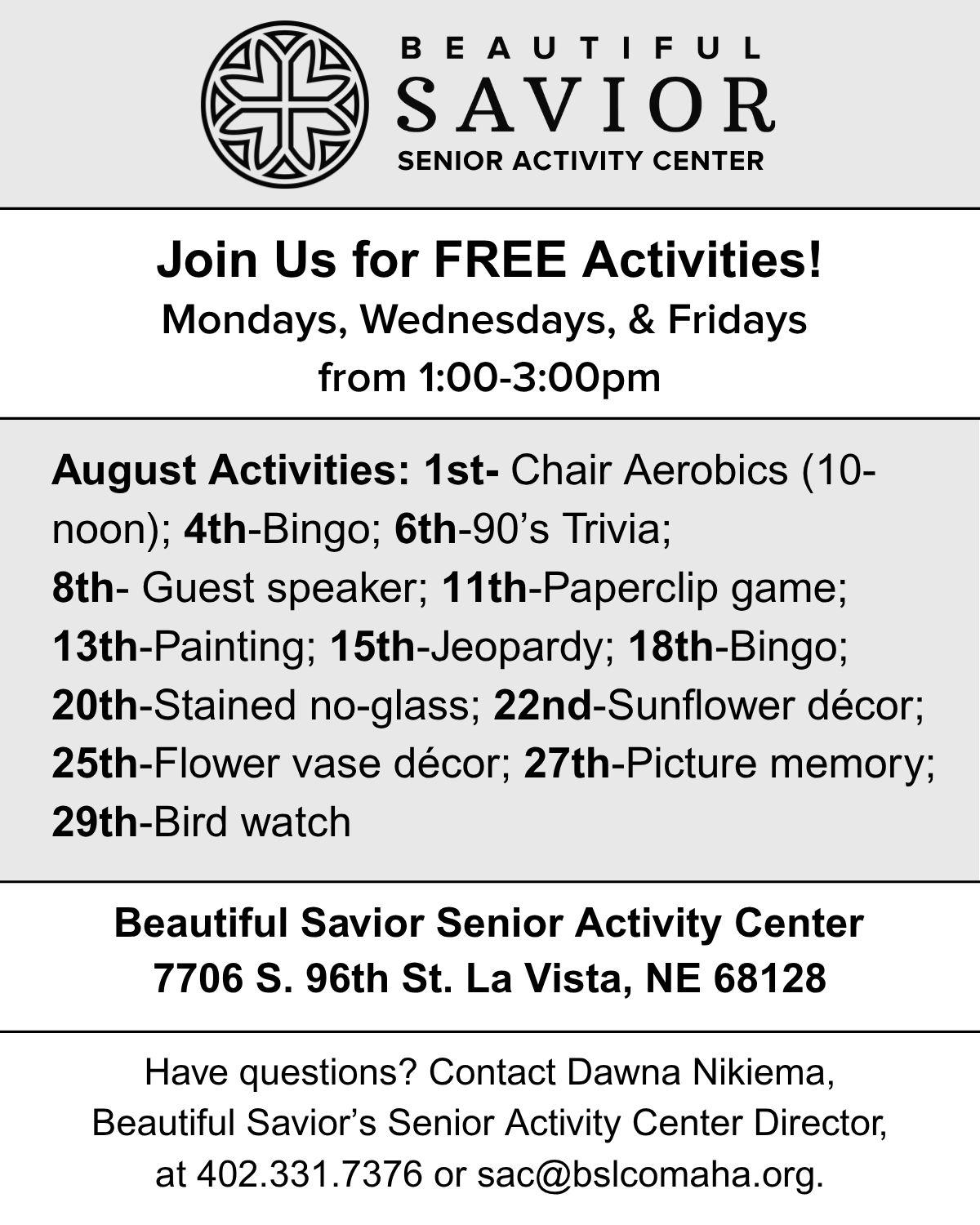

lots
By Andy Bradley Contributing Writer
Part one of a two-part series
Reasons to delay the decision are many and varied. “Well I can’t move, I have too much stuff. I can’t move, I don’t know where to go. I can’t move, I don’t know how to pay for it.”
And the list just goes on, sometimes until the decision becomes a mandate, not an option. “Sometimes, unfortunately, people wait at home too long,” said Joni Sturek, owner of Family Ties Senior Placement Services. “There’s a fall. Typically, there’s some kind of injury. They go to the hospital, they go into rehab, they can’t go home, and so we need to place them. We need to find a community fast.”
At that point, personal likes and preferences take a back seat to expediency.


Montanna Walling, Division Director for Case Management at the Eastern Nebraska Office on Aging (ENOA), said her staff routinely deals with the reluctance of frail and vulnerable seniors to move. They protest, “I’m doing just fine,” despite visible and tangible evidence to the contrary. “Care managers deal with that every single day.” The signs may be obvious even to the casual observer. “What’s their quality of life in their home if they’re not able to get out of their chair, if they’re soiling themselves several times a day, and they can’t change their undergarments regularly?” Walling asked.
“What kind of quality of life are they living?”
Sturek said tell-tale signs can also include the inability to make financial decisions or manage financial affairs and a living environment spiraling into disarray.
“When you start seeing some of these signs, it’s time to start having some conversations.”
Only those early con-
versations often result in pushback rather than concurrence. It usually takes a series of difficult discussions before the loved one acquiesces, Walling said. “In my experience, the first, second or third conversation is usually never the one that they agree about. It just takes time to chisel away.”
Interactions should focus on options, not mandates, suggested Walling. “Always provide that individual with all their options so that they can have more time to think about it, to be more open-minded. Help the person realize this is ultimately their decision. So I would say it just takes time.”
Options on the table can range from in-home care, some of which can be coordinated through ENOA; adult day care; downsizing to a smaller environment, including apartments or townhomes; joining an independent senior living community, where meals and light housekeeping may be provided; assisted living to help with basic activities of daily living; memory care when dementia symptoms are prevalent; and long-term skilled nursing care.
A number of area campuses offer a combination of these alternatives so residents can more readily transition from one level of care to another as needed.
Once the decision is made and a new home is identified, the logistical obstacles and challenges of uprooting and resettling remain. That’s where professional transition and move management experts can help.
The steps, which don’t always proceed in a strict linear order, include inventorying household possessions, identifying the discards, retaining a realtor, cleaning, preparing and staging the home for sale, reserving a moving company, packing, moving, and settling in. However daunting these tasks appear, professional help is available to coordinate, manage and execute each and every step.
“I facilitate everything from the real estate transaction to helping people find the community and everything in between,” Sturek said about her Family Ties company. “I have connections for that entire process. I try to be the one point of contact for families because they’re going through so much right now . . .
They don’t need to worry about the move. They don’t need to worry about who’s going to help with the home repairs to get it ready for sale. I try to be that all-inclusive person for that.”
The Move Coordinators provides similar services. Co-founder and Senior Move Manager Molly Beacom put it this way – “We are the general contractor of your move.”
“We really developed a custom set of services,” said the Moves Coordinator co-founder and CEO Lesley Brandt. “You might have a china cabinet that requires special attention. You might have a grand piano that needs to be moved. You might have sports memorabilia that you would like to sell.”
That early process of discerning what personal possessions and furniture can be transferred and what should be either donated, sold, passed on to relatives or disposed of entirely can be gut-wrenching.
Brandt helps her clients make those decisions in what she calls “sorting sessions.” If the move is not in the immediate future – and Brandy strongly suggests long-term advance planning – “it might take us a good year to go through your home.”
Items are catalogued into two simple categories – items they need, use and love and those they don’t. Another determining factor is how much space is available in the new location.
“A lot of holiday stuff doesn’t always make the cut.”
Sturek also helps clients through the sentimental process of helping clients determine what stays and what goes. “Usually it’s a lot of photos, maybe some favorite dishes, it’s more emotional things. And then is there something your family wants – and usually the family wants none of it –Is there enough for an estate sale?”
While transition consultants are not movers, they can mitigate that entire process, from securing bids, facilitating contracts, and overseeing the actual packing, moving and unpacking process.
The day of the actual move is generally fraught with organized chaos and highly charged emotions.
--Moving continued on page 3.
“Neat freak” is not how any of my friends would describe me. However, I do like order and dislike messes. When things get too messy, I usually do something about it. I have been mulling over a paradigm I learned from my current favorite author, Richard Rohr. He describes life using the terms order-disorder-reorder. He believes this pattern permeates our individual and collective life experience.
A simple example in my home is the monthly visit from my house cleaners. Daily cleaning keeps the house livable but not pristine. In the normal order a little messiness sets in over the month. Then our wonderful cleaners come while I get out of the way. Three hours later the house has been reordered much to my delight.
Another bigger example of the pattern is moving. My friends recently downsized from their house to an apartment. The order they enjoyed in the house was disrupted by a couple of months of major disorder. There was a garage sale, online selling, donations, and finally packing. The disorder, though difficult and exhausting, has yielded to
By Nancy Hemesath
new circumstances and they are happily adapting to their new reordered life.
Order-disorder-reorder is also evident in interpersonal relationships. We all experience conflict from time to time that may turn into arguments and hurt feelings among our family, friends or colleagues. What was an amicable ordered relationship get upended into disorder. Sometimes the disorder lingers and festers causing deep hurt and alienation. To move into “reorder” is a choice. This choice likely includes listening, dialogue, and forgiveness. This is normally the path to a reordered relationship. Anyone who has been in a long-term loving relationship knows this well because they have experienced it many times over.
This pattern is also descriptive on a macro-level. The national and global experience at this time is significant disorder. We tend to recall times when we experienced more order. Now very few are comfortable with the disorder that
Moving continued from page 2.
Sturek encourages her clients to go on an outing with a family member while the movers are scurrying around.
“I’m probably going to be holding your hand while I pack your china cabinet and Leslie’s going to be in your basement running around your storage room going crazy,” said Beacom. “It’s literally organized chaos.”
Then, after the movers have called it a day, the real transition starts. “Settling is a huge piece of it. This is where we shine,” said Brandt. “We’re unpacking, we’re setting up a kitchen, we’re setting up the TVs, making the bed, getting their bathroom set up. We hang pictures, the towels are on the racks, the pillows are fluffed, the cable is on, the internet is hooked up to the computer. Our clients open the door for the first time, and it looks like they’ve lived there for two years. They’re ready to sit down and watch their favorite show that night.”
Sturek explained the process in similar terms. “I work really hard to re-create their spaces. “What are the things that make a home feel like home? And then I work to make that happen. We hang all the clothes in the closet, we put things in the dresser . . . we can have the person come into the new apartment and they’re always blown away. ‘You already have my stuff set up! I don’t have to do it!’ They come in and they
has become the daily news cycle. Unlike the example of the clean house or new apartment, it is not easy to see when the reordering will take place or if it will, indeed, emerge. The goal, of course, is to work together to reorder a society that is far better than the old order. With the benefit of many years of hindsight, we can recall many disordering events we have lived through. In every case some kind of reordering emerged. This is a source of hope that promises that again something new will emerge. We don’t know how long disorder will last but we do know it is not the end of the story, especially when we do our part to write the script for a better re-ordered world.
(Hemesath is the owner of Encore Coaching. She is dedicated to supporting people in their Third Chapter of Life and is available for presentations. Contact her at nanhemesath@gmail. com.)
immediately relax, because that wasn’t what they envisioned.”
Despite the overwhelming nature of this undertaking, experts encourage their clients to expedite the process sooner rather than later, especially when transitioning to an independent senior living community.
“Try to move a loved one when they can enjoy it,” Sturek urged, explaining that communities offer multiple amenities and activities that cater to the interests of their residents. “We would love for people to enjoy whatever time they have. Some people just stay stuck at home too long, because it’s all that they know.”
For example, “I had a gentleman who loved playing chess, but he was isolated in his home, and he played chess on his computer. One of the things we asked when we were touring communities was, ‘do you have any chess players here?’ And he ended up going to a community with three pretty avid chess players. And he doesn’t play online chess anymore.”
“So we try to find that connection of what it is that they’re loving so much, and how do we make that happen here?”
As a result, “Most people will say I should have done it years ago.”
For more information about the services featured here, go to themovecoordinators. com, familytiesseniorplacements.com. and enoa.org.

New Horizons is the official publication of the Eastern Nebraska Office on Aging. The paper is distributed free to people over age 60 in Douglas, Sarpy, Dodge, Washington, and Cass counties. Those living outside the five-county region may subscribe for $5 annually. Address all correspondence to: Ron Petersen, Editor, 4780 S. 131st Street, Omaha, NE 68137-1822. Phone 402-444-6654. FAX 402-444-3076.
E-mail: ron.petersen@enoa.org
Advertisements appearing in New Horizons do not imply endorsement of the advertiser by the Eastern Nebraska Office on Aging. However, complaints about advertisers will be reviewed and, if warranted, their advertising discontinued. Display and insert advertising rates available on request. Open rates are commissionable, with discounts for extended runs. Circulation is 9,000 through direct mail .
Editor................................Ron Petersen, 402-444-6654 Ad Mgr................Mitch Laudenback, 402-444-4148
Contributing Writers.........Leo Biga & Andy Bradley
ENOA Board of Governors: Mary Ann Borgeson, Douglas County, chairperson; Don Kelly, Sarpy County, vice-chairperson; Lisa Kramer, Washington County, secretary; Pat Tawney, Dodge County, & Taylor Boyle, Cass County.
The New Horizons and the Eastern Nebraska Office on Aging (ENOA) complies with applicable federal civil rights laws and does not exclude, deny services to, or otherwise discriminate against any person on the basis of race, color, national origin, disability, age, sex, marital status, veteran status, or religion.
By Kelly C. Bourne
Malware, i.e., “malicious software”, is software that has been created to harm computers. Malware is an umbrella term that includes many different types of threats. Specific examples
of these types and how they attack computers are described here: Ransomware encrypts files or computers making them inaccessible until the owner pays a ransom. The number of ransomware attacks and ransom amounts increased in 2024


•
•



over previous years. One of the most common ways for a computer to become infected with ransomware is by opening documents attached to phishing emails. Other infection methods are social engineering attacks, using outdated software, using pirated software and visiting malicious websites.
Viruses are programs that infect computers by attaching themselves to files on the targeted computer. Once a computer has been infected, the virus will attempt to replicate itself on additional computers that can be reached from the victim’s device. The potential damage that a virus can do includes slowing down the computer, causing the computer to crash, displaying unusual error messages or screens, damaging or deleting critical files and stealing data like credit card numbers, usernames, passwords, and browsing history.
Worms are similar to viruses, but don’t need human action to get installed on a computer. Viruses need users to do something like click a link or open an infected email attachment. Worms, in contrast, can spread by exploiting vulnerabilities in computer operating systems.
Bots are computers that are infected with malware that allows a cybercriminal to control them remotely without the owner’s knowledge or permission. Many kinds of electronic devices can be turned into bots.
For example, desktop computers, laptops, tablets, smart phones, wireless cameras, routers, smart thermostats and smart speakers are all vulnerable. When a bad actor controls multiple bots, it’s called a botnet or bot army. Some botnets contain hundreds of thousands of devices. Bots can be used to send out spam, crack passwords, participate in credential stuffing attacks, post items on social media sites, collect email addresses, engage in click fraud or participate in DDOS (Distributed Denial of Service) attacks to cripple websites.


logging into applications and websites. The criminal could then log into an account and withdraw all of its contents.
Scareware is malware that displays a warning on a monitor stating that the computer is infected with a virus. It’s actually just a harmless pop-up ad like many others that people see all the time. Scareware tells the user that by clicking a button or link the threat can be removed. If the user clicks on it then a virus, ransomware or other form of malware will be installed. Users can prevent pop-up ads, including scareware, from being displayed by installing a pop-up blocker in their browser.
Spyware is software that literally spies on computers and smart phones it is installed on. It collects personal data like credit card details, usernames, passwords, banking information, geographic location data, calling history and browsing history. Once collected, this data is sent to the cybercriminal behind the spyware. If the bad actor can obtain usernames and passwords, he will be able to log into and take over the victims’ accounts.
Cryptojacking is a form of malware that uses the victim’s device to mine, i.e. create cryptocurrency. Mining cryptocurrency takes an enormous amount of computing power and electricity. If cryptojacking software is installed on your computer, you’ll end up with a much slower computer and higher electricity bills while any cryptocurrency profits will go to the criminal.
that other malware causes without the victim knowing about it.
Common ways for devices to be infected with malware are:
• Opening emails attachments that contain a virus or other malware.
• Clicking on links in emails that take you to a malicious website.
• Downloading software, games, video, etc., from an unsafe site.
• Plugging an infected USB drive into your computer.
• Visiting an infected website. This is called a “drive-by download”.
• Clicking a link in a text message leading to a malicious website and causing an infection.
If a computer is infected with malware the owner should purchase, install and run a reputable antimalware program to remove it. In an extreme case, all the computer’s software would need to be deleted and reinstalled. Your data would then be restored from backup files you’ve previously created. The following actions are ways that users can prevent malware infections on their computer and phones:
• Install an antivirus or antimalware package and keep it updated.
• Apply all updates and patches to the operating system, browsers and other applications on your devices.
• Install a pop-up blocker in your Internet browser.
• Exercise caution before clicking on questionable links or buttons.
Keylogging malware records keyboard activity of the victim computer. Periodically this data is sent back to the cybercriminal who created the keylogger. By observing all activity on a device, the criminal can learn the owner’s account IDs and passwords used for
Adware displays unwanted ads on computers or smart phones where it’s installed. Victims experience a slower computer as well as the frustration of having to close ads that keep appearing on the screen. The bad actor that created the adware receives a small payment for every ad that’s shown to the victims. Adware can infect a computer if the user downloads free applications, games, videos or music that have had this malware included in them.
A Trojan horse is malware disguised as an application, game or other piece of useful software. The victim installs it thinking he’s getting something for free. Once it’s installed it can have many of the negative actions
• Download software only from reputable websites. For iPhones it’s the App Store. For Android phones it’s the Google Play Store.
• Avoid suspicious websites.
• Create regular backups. This won’t prevent malware infections but can help restore your computer to its previous state after the malware has been removed.
Malware is a very real danger for computers and other electronic devices, but it can be avoided. By following the actions in the previous paragraph, users can help prevent malware from impacting their lives.
Kelly’s newest book, “Ransomware, Viruses, Social Engineering and Other Threats: Protecting Your Digital Assets” is available on Amazon.
By Melinda Myers
Rabbits are year-round and frequent visitors to gardens and landscapes. As children, we read about and adored these furry critters. This love of rabbits often faded as we grew older and experienced damage to our gardens and landscapes. Employing various management strategies allows us to co-exist with these cute yet voracious members of our community
Rabbits eat a wide range of plants including flowers, vegetables, and weeds throughout the spring and summer. As these plants fade in fall, they begin dining on trees and shrubs. You may find bark gnawed, evergreen needles nibbled, and branches, stems and buds clipped off the plants.
Their sharp teeth make a clean cut much like a bypass pruner at a 45-degree angle. Rabbit damage usually occurs within three feet of the ground where they can easily reach and dine on the plants. Look for tracks and droppings, often called pellets, if additional clues are needed. The pellets are little, round, hard, and usually yellowy brown to green.
Our landscapes provide the perfect habitat for rabbits. They tend to concentrate in open grassy areas that have patches of desirable cover like brush piles, shrubs, and gardens that provide an escape from predators.
These short-lived mammals tend to be very productive, giving birth to two to six litters of four or more babies in a season. Diseases, weather, predators, hunters, and cars help limit the number of surviving offspring. Start by removing hiding places like brush piles, weed patches, and stone piles that provide places for rabbits to live and hide. Work with your neighbors who may not realize they are housing rabbits feeding in both of your yards. Leave a few weeds and perhaps some clover in the lawn as an alternate food source for them.
You will find lists of rabbit-resistant plants, but as gardeners know they will eat just about any plants when populations are high and food is scarce. Protecting key gardens and plants will help reduce the risk of damage and increase your enjoyment.
Fencing is an effective management strategy but may not be practical or aesthetically pleasing. When employing fencing, be sure it is high enough to keep rabbits out and the openings are 1 inch or less. A 3-foottall fence with an outward baffle at the top or one 4-foot tall is more effective. Secure the fence tight to the ground or bury the bottom few inches to prevent rabbits from crawling under. Check the gate, adding flaps and sweeps as needed to prevent rabbits from gaining access to the garden.
Use 4-foot-tall cylinders of hardware cloth around young trees and shrubs to prevent damage. Place the cylinder several inches away from the trunk and bury the bottom few inches in the soil to prevent rabbit and vole damage.
Repellents are a less obtrusive option and more practical for many gardeners. Select a product labeled for rabbit control and preferably an organic option like Plantskydd (plantskydd. com). This odor-based repellent is rain and snow resistant so you will need to reapply less often. Whenever possible, apply repel-

lents before the rabbits begin feeding and follow the label directions for the best results.
Evaluate and adapt your landscape design as needed and continually monitor for damage. Employ various strategies to help reduce rabbit damage while boosting your enjoyment and garden’s productivity.
Melinda Myers has written over 20 gardening books, including Midwest Gardener’s Handbook, 2nd Edition and Small Space Gardening. She hosts The Great Courses “How to Grow Anything” instant video and DVD series and the nationally syndicated Melinda’s Garden Moment radio program. Myers is a columnist and contributing editor for Birds & Blooms magazine and was commissioned by Tree World Plant Care for her expertise in writing this article. Her website is www.MelindaMyers.com.
ou’re invited to visit the La Vista Senior Center, located at 8116 Park View Blvd. The facility provides activity programs and meals Monday through Friday from 8 a.m. to 5 p.m. Please call 402-331-3455 for general Community Center hours.
Meals are served weekdays at 11:30 a.m. Reservations are due by noon the business day prior to the date the participant wishes to attend and can be made by calling 402-331-3455.
A $5 contribution is suggested for the meal if you are age 60 and older. If you are under age 60, then the meal cost is $9.50.
In addition to meals being served daily, the La Vista Senior Center offers a variety of activities such as: Bingo, outings, cooking classes, movies with popcorn, arts and crafts, a variety of card games, quilting, tai chi, exercise classes, musical entertainment and various parties. Please visit our website at cityoflavista.org/seniors for updated information or call 402-331-3455.


Please see the ad on page 3
$100
Pat Loontjer
$50
Donna Chaney
$25
Marilee Kelly
Brenda Kreber
$10
Matie Weatherford
Karen Doty
Charmaine Fielder
Karen Campbell
$5
Alexis Johnson
Judy Hoscheid
You’re invited to visit the Millard Senior Center at Montclair, 2304 S. 135th Ave., this month for the following:
• August 6: Board Meeting @ 9:45 a.m.
• August 11: Bunco @ 12:15 p.m.
• August 12: Luau lunch @ 11 a.m.
• August 12: Sewing Club meet to make sun dresses and shorts at home that are donated and distributed to several countries @ 9:30 a.m.
• August 25: Book Club: “The Thursday Murder Club“ by Richard Osman @1 p.m.
• August 28: Football season begins. Wear your football swag to root for your favorite team.
Karen Robards @ 1 p.m.
Tai Chi on Mondays and Fridays @ 9:30 a.m. Bingo every Tuesday and Friday @ 12 p.m.
Sportswear Fridays. Wear your favorite team attire every Friday.
Hand-N-Foot Wednesdays @ 8:30 a.m.
MahJongg Wednesdays @ 1 p.m.
Chair Volleyball Thursdays @ 9:30 a.m.
Dominoes Thursdays @ 12:30 p.m.
For more information, please call 402-546-1270.
By Lois Jordan
As August arrives, we find ourselves in the gentle stretch of summer – a time when gardens are at their peak, sunsets seem to linger a little longer, and memories often come rushing back with the sound of cicadas or the smell of tomatoes ripening on the vine.
August can be a month of slowing down and soaking in the season’s small pleasures. Whether it’s sitting on the porch with a glass of iced tea, enjoying a summer concert in the park, or sharing a cool treat with grandkids, this is a month that invites us to be present and grateful.
For many of us, summer brings nostalgia. Perhaps it’s remembering family vacations, county fairs, or long-ago summer jobs. These stories are treasures, and sharing them can bring joy not only to ourselves but to those around us. Don’t be shy about telling your tale. Younger generations love hearing about life “back
then,” and your memories are part of the thread that connects us all.
As we look ahead to fall, August also serves as a reminder to take care of our well-being. Be sure to stay hydrated, protect yourself from the heat, and take breaks during outdoor activities. Your health matters, and small steps can go a long way toward staying strong and well.
So, this August, let’s take time to enjoy what’s right in front of us: Sunshine on our shoulders, the laughter of friends, and the comfort of familiar routines. Summer may be winding down, but its beauty is still very much here.
Wishing you peace, health, and plenty of summer smiles.
Lois Jordan, CEO for Midwest Geriatrics Inc. Management company for Florence Home Healthcare Center, Royale Oaks, and House of Hope Assisted Living and Memory Care
In this month’s scam, you receive a text message that appears to be from the Department of Motor Vehicles (DMV). The text states that you must pay a traffic fine by a certain date. If you don’t pay on time, your vehicle registration will be suspended, and you’ll lose your driving privileges.
Some versions of the message even state that you’ll go to jail or your credit score will be affected if you don’t pay.
The text message contains a link and instructs you to click it so that you can pay the fee. However, these messages aren’t sent by the DMV.
They’re actually phishing texts (smishing) sent by cybercriminals. There was never an actual traffic fine or penalty. If you click the link in the text message
and make a payment, your money will go directly into the cybercriminals’ pockets.
The message may seem legitimate, but this is actually a text message phishing attack (smishing). It was sent by a cybercriminal, and the phone number provided in the text message won’t actually connect you with a customer support team. If you call the number, your call will be answered by a cybercriminal.
Follow these tips to avoid falling victim to a smishing scam:
• Be cautious if you receive text messages claiming you must pay a fine immediately. Scammers often create a sense of urgency to trick you into acting impulsively.
• The DMV wouldn’t ask
you for personal information or money through a text message. If you have questions about paying a fine, contact your local DMV through its official website or phone number.
• This scam targets users in the United States. However, cybercriminals can use these same tactics to try and trick users anywhere in the world. Always stop and think before you click.
• Be suspicious of unexpected text messages, especially if they seem urgent.
• Be wary of messages from strange phone numbers you don’t recognize. If you need to contact customer support for one of your accounts or services, always use the contact information listed on their official website.
For more information, visit KnowBe4.com.
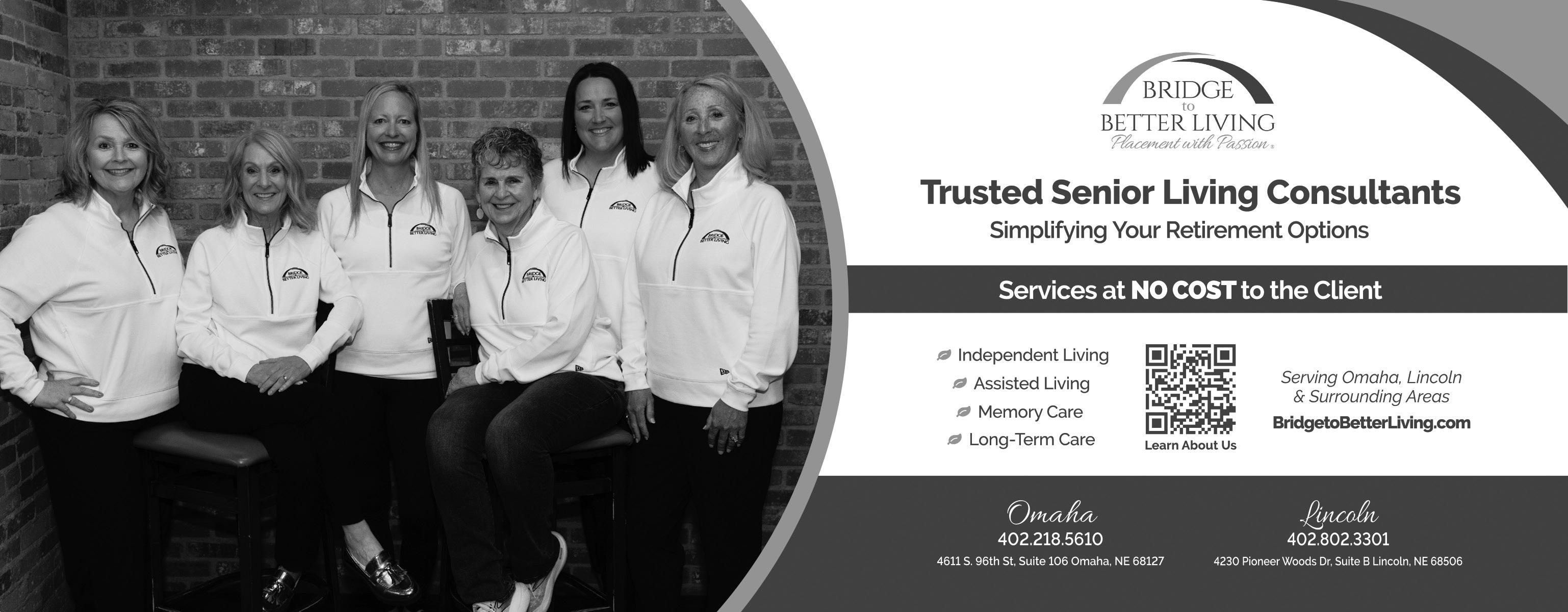
You’re invited to visit the Fremont Friendship Center, 1730 W. 16th St. (Christensen Field). The facility is open Monday through Thursday from 9 a.m. to 3 p.m. and Friday from 9 a.m. to 12:30 p.m.
A meal is served weekdays @ 11:30 a.m. Reservations, which are due by noon the business day prior to the meal the participant wishes to enjoy, can be made by calling 402727-2815. A $4.25 contribution is suggested for the meal.
This month’s activities will include:
• August 6: Merry Maker’s Presents the Links @ 10 a.m.
• August 8: Bingo with Pro-Med Care @ 10:30 a.m.
• August 13: Music with Ben Tomasello @ 10:30 a.m.
• August 14: Mobile Library @ 9:30 a.m.
• August 14: Veteran Services Update with Mark @ 10 a.m.
• August 20: Music with Pam Kragt @ 10:30 a.m.
• August 21: Early Bird Bingo followed by a Presentation by Pinnacle Bank on Fraud @ 9:15 a.m.
• August 22: Wheel of Fortune w/ Lori @ 9:30 a.m.
• August 26: Board Meeting @ 1:30 p.m.
• August 27: Music with Bill Chrastil @ 10 a.m.
Craft class on Tuesday afternoons @ 1:30 p.m.
Tai Chi offered every Tuesday and Friday from 9:15-10 a.m.
If you can’t stay for lunch with our friends and you currently participate in any activity at the center, you may now order a Grab-n-Go meal to take home for your lunch. Grabn-Go meals must be reserved the day before by noon and the person ordering the lunch must come in to the center to pick it up at 11 a.m. The number of Grab-n-Go lunches are limited to a first come first serve basis. Suggested donation is $4.25.
For meal reservations and more information, please call Laurie at 402-727-2815.
You’re invited to visit the Camelot Friendship Center, 9270 Cady Ave., for regular activities, which include Chair Yoga, card games, Tai Chi, Pinochle, 10 Point Pitch, and bingo. This month’s events include:
• August 4: Center Closed for one week
• August 13: Craft - Free No Sew T-shirt Tote @ 12 p.m.
• August 14: Jackpot Bingo @ 12:15 p.m.
• August 17: Team Trivia Challenge @ 12 p.m.
• August 19: Bingo with Heather with AmanaCare @ 12:15 p.m.
• August 26: Entertainment with Joe Taylor compliments of Merrymakers @ 11:45 a.m.
Every Monday – Card Game: Manipulation @ 10 a.m.
Every Monday – Pickleball @ 10 a.m.
Every Monday and Friday – Bingocize @ 10 a.m.
Every Tuesday, Wednesday and Thursday – Kings in the Corner @ 10 a.m.
Every Wednesday – Chair Volleyball @ 10 a.m.
Everyday – Card Games @ 10 a.m. Grab N Go meals are available.
For more information, contact Barb at 402-444-3091 or barbara.white@cityofomaha.org.
of us. Finding ways to relieve
is
our overall health and wellbeing. Caregivers are not immune to this stress. Please contact Respite Across the Lifespan at edbennett@unmc.edu or 402-559-5732 to find out more about respite services and to locate resources in your area.
First United Methodist Church has some excellent adult curriculums available. They are free for any Christian group which would like to study prayer, discipleship and beliefs.
Call First United Methodist Church at 402-556-6262 if you wish to receive more information about the list of the studies available.



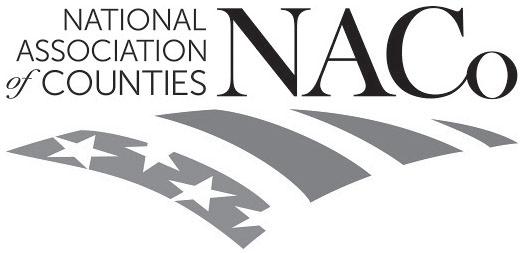
By Ron Petersen
The Eastern Nebraska Office on Aging (ENOA) Diner’s Choice program is going to see a new change this month.
Starting in August, the Diner’s Choice program welcomes Taqueria Chango, a Mexican and Salvadorian restaurant in Omaha.
“It’s a good feeling being able to provide someone a meal and to be entering the Diner’s Choice program,” Taqueria Chango manager, David Portillo said. “We take pride in what we do, and we enjoy providing meals for people in the community.”
Taqueria Chango’s journey began in the early 1990s, when Sara Saenz (original owner), an immigrant from El Salvador, started a small food stand inside a supermarket in Omaha. The food quickly became popular in the community, so much so that she was asked to relocate to a restaurant.
They relocated to the current location where the restaurant sits today at 2405 Hickory St.
Along the way, she brought in
Trust continued from page 1.
have to bail me out.
“I’m not thinking clearly because the whole situation is accelerating on me. So I start fumbling for my credit card.” At the next traffic light, he came to his senses and hung up, deciding it was all a scam. “But in the moment, it felt very real.” He should have known better. The work Josh was rushing to that morning was at KETV, where Josh was a newscaster.
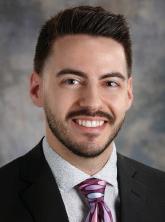
His beat included reporting about consumer fraud.
“I’m writing stories nearly every month about scam victims, about people who lost life-changing sums of money to things that are not real.” He should have known.
Yet scammers, the really good ones, the ones who are part of large, sophisticated, international rings, excel at making the scam narrative credible.
In Josh’s case, the scammer, Agent Williams, had perpetuated this same hustle upon hundreds of unsuspecting victims. His success stemmed from his clandestine behind-the-scenes homework – the research he was able to unearth on his victims, including their address, employer, age, academic background, even bank account information. All contributing to the plausibility of their hustles.
Upon further review, several red flags created reasonable doubt about the validity of Agent William’s extortion efforts.
These included creating a sense of urgency, threatening extreme repercussions for non-compliance, catching the victim at a vulnerable time, such as while driving, all while spinning a plausible tale

Jesus, also known as Chango, brings over 35 years of culinary experience to the kitchen—from high-paced professional kitchens to bustling casino buffets. Today, he runs his own kitchen alongside his wife, Veronica, who carries three generations of culinary tradition passed down from her mother Sara Saenz.
a new chef, Chango, who brought his culinary roots to the table by blending the Salvadoran and Mexican traditions. Chango and
– “maybe I did mess up on my taxes last year.”
Consumer fraud has increased exponentially year after year, said Planos, who spoke at a scam prevention workshop June 27 at the University of Nebraska at Omaha.
Planos is the vice president of marketing, communications and public relations at the local Better Business Bureau (BBB). He is the local point person for BBB’s scam awareness, education and prevention efforts.
“Working in scam prevention in 2025 is like drinking from a fire hose, he said. While $12.5 billion was lost to scammers last year, this represents a small percentage of the actual losses, said Planos. “Eighty percent of fraud goes unreported.”
Top reported fraudulent practices in Nebraska this year include:
• Online purchases, including Amazon impersonations;
• Phishing (the practice of sending emails or other messages purporting to be from reputable companies in order to trick recipients into surrendering personal information, such as passwords and credit card numbers);
• Bogus employment schemes, including remote work arrangements;
• Fake prizes, sweepstakes and lotteries (being asked to pay fees or taxes before receiving your alleged winnings);
• Panic-inducing texts and emails from public agencies such as the IRS, DMV, or financial institutions claiming you owe them money. (Fraudsters trick people into paying for debts they don’t actually owe);
• Tech support (scammers use scare tactics to trick you into unnecessary technical support services to supposedly fix computer problems that don’t exist).
“What do all of these scams have in common? Every scam that has
his wife, Veronica, now lead the business side while Sara enjoys retirement after running the business for 35 years.
ever existed has been after personal and payment information,” Plano’s said. That is the root. And all of these scams reported to us rely upon stress to influence your decision making.”
To protect ourselves from falling victim to these and other swindles, “I’ve devised a four-step STOP plan,” said Planos.
• Slow down – don’t be coerced into acting now. Don’t succumb to pressure in the heat of the moment;
• Talk to someone – anyone – before acting; get another perspective that can remove the fear, emotion and urgency from the situation;
• Observe the details – what doesn’t sound or look or feel quite right about what you are encountering?
• Protect your information – be reluctant to reveal to anyone personal identifying information, including address, phone number, financial accounts and Social Security numbers.
“With just a few bits of information, a scammer can bypass bank security questions,” plano said. “They can take out a loan. They can reset your online credentials. And yet, we regularly gamble with this information all of the time.”
In sum, the most effective strategy is to “think before you trust,” cautioned Planos.
Planos added, “I have a personal policy that I would recommend, and it’s pretty simple. If I do not have your number saved, I am not answering that call. If it is important, you are probably going to leave me a voicemail, and I’ll call you back on my terms.”
Planos also urged consumers to be hyper-aware of two emerging scams – one involving cryptocurrency and the other artificial intelligence (AI).
The demand that the unsuspecting victim use cryptocurrency to pay
“It feels great knowing that we’ve been able to make food for three generations,” Portillo said.
Over time, not only have they served food at their own restaurant, but they have also provided meals for the Intercultural Senior Center for 15 years. This last year, Taqueria Chango was able to serve 15,905 meals to those at the Intercultural Senior Center. They provide hot meals along with a vegetarian menu.
“We commercialized the kitchen for higher volume,” Portillo said. “We have options for everyone.”
Taqueria Chango is opened to adding a second location, but for now they will continue to serve customers at their restaurant, along with serving those at the Intercultural Senior Center and in the Diner’s Choice program.
“It’s something to be proud of when helping out the old folks,” Portillo said. “We have been ready, and we are ready to serve those in the Diner’s Choice program tomorrow.”
for services, fees or fines is a red flag – so much so that the Nebraska Legislature last spring passed legislation placing restrictions on the use of crypto at ATM machines in this state.
Just as onerous, AI can mimic faces, personas and intimate details of real persons. The uninformed can fall for pitches that they believe are generated by authentic sources – family members, coworkers, government officials or religious leaders. For example, what appears to be a real voice and image from your teenage grandson pleading for money is fake – created by inventive conartists who can clone voices and photos to eerily approximate the real thing.
So whatever happened to Agent Williams? “That phone call was not from Washington, D.C.. That phone call was from India.” And the man was eventually arrested. His scam wasn’t all that uncommon – part of an international ring of extortionists posing as IRS employees.
While Planos hung up on his perpetrator, 6,300 others nationwide did not, forking out over $10 million to the crooks.
Planos said reporting fraud to the BBB or the state attorney general’s office is important to contain illegal hustles. “I really get the sense from many folks that they feel nothing will ever be done with their report,” said Planos. “And that’s really not true.” Agent Williams’s arrest case in point.
“So if you have been scammed, the most important thing you can do is report it.”
Call the BBB at 877-637-3334 (toll free) or contact the Nebraska Attorney General’s office (402) 471-2683. Comprehensive scam prevention information and resources can be accessed at bbb.org. or through AARP.
Will continued from page 1. You taught me everything. So I got a chance to give her her flowers.”
In addition to the positive influence Bounds exerted, Will benefited from a stable home life and the valuable lessons taught by her parents, which not all her friends and classmates growing up were so fortunate to have. She graduated from private Omaha Marian High.
Much of her informal education came at her mother’s salon, where she was a precocious presence. “I got a great foundation working at my moms’s salon”
Will went on to become a licensed cosmetologist and later added certifications in lashes, skin care and body treatments. She was expected to take over Sonia’s.
“That would have been fine,” Will said, “but I wanted to branch out I didn’t want to be strictly cosmetology, I wanted a spa. I tried to talk her into adding a spa onto her place and she just wasn’t ready for it and so I determined to break out on my own. I didn’t always want to be ‘Sonia’s daughter.’ I wanted to create my own legacy. That was my dream.”
Will ended up doing her own thing but credits her mother’s undeniable influence.
“She was very instrumental. I had that model. She was very particular about everything – about how her salon looked, it was always clean,” she said.
The always put-together Will could have chosen a safer route but her independence won out. “I have such an entrepreneurial spirit,” she said. That spirit led to launching her own etiquette education agency, The Finer Things. Having observed the basics of polite behavior once taught at home going by the wayside, she decided to offer training.
“I recall one girl was having all kinds of problems in school. She was about to get kicked out her mom was like, I don’t know what else to do with this child.’ I said just send her to me.’ I had her look in the mirror and say five things she liked about herself. Instilling confidence and self-esteem starts internally. With her learning to like herself she learned to be respectful to others. The mom shared that a teacher contacted her to say ‘I don’t know what you’ve done with this little girl but she’s completely

changed, she’s a joy to be with.’ ”
TRANSFORMATION, SANCTUARY, RELEASE
Transformation follows intention. “When you have confidence and you’re taught certain things you can excel in life,” said Will. “It’s learning how to play the game.” Will next applied similar principles to a Welfare to Work program she developed for the City of Omaha. She applied for and secured a government grant to implement the program.
“I trained women that had had a hard time in life and were trying to transition back into the workforce by teaching business etiquette, how to prepare for interviews, how to dress for success, what is appropriate hairstyle or makeup. Years later I had women come up thanking me for helping them get to a new place in their life. My contract lasted nine months. I reinvested the money I made from it into my first salon.”
Her first salons, under the name The Velvet Chair, were in Benson. She added onto them. Several years ago she rebranded as Lash Goddess. The site she’s at today, 1919 Papillion Parkway, was an empty, blank slate when she got it. She transformed it into a plush sanctuary of healing, soothing color, light, scents and sounds.
“I love building and decorating. When I built this place out I was going through a really rough time in my life. This project helped me keep an even frame of mind. Whatever I needed to feel at that time I poured it all into this space. When people say, ‘Oh, it’s so relaxing, so cozy,’ that makes me feel good. That’s
what I want people to feel. Just leave it all at the door, come in, and relax.”
“Yes, my women love lashes or whatever (facials, manicures, pedicures, body waxing, massage) they come to get, but I think sometimes they just come to get away from life – just to breathe and to have an hour to themselves.”
She has a diverse clientele. “Yes, I’m Black, but I service everybody. I love catering to everybody. With all the crazy, negative stuff on the outside, we just leave it at the door. My ladies come from all walks of life, they lay on my table and we’re like the best of friends. That is one of the reasons I keep this place open. Sometimes I’m tired and just want to move to Mexico and not come back, but my clients are what keep me here.”
MEXICO ODYSSEY
Fast Forward to the start of the COVID pandemic when she and a man she dated then went to Cancun and fell head over heels for resort properties there.
“We ended up choosing one we had an amazing connection with,” she said. “Signed all the papers for a year’s lease. Then my partner bailed out on me. I was like, ‘Okay, do I give up my dream or do I do this by myself?’ After lots of thought and consideration I was like, “Mia, don’t give up on your dream, do it.’ The way I think of it now is that the person I went there with led me to that dream, he was not meant to be a part of it. It was a self journey and it was the most incredible journey.”
Due to the way things played out, she said, “I always say I didn’t choose Mexico, Mexico chose me. It was just a spiritual connection. It’s been the best since taking the leap five years ago. The house I lived in then was four bedrooms, five baths with a huge pool. I was the only foreigner.” With all that extra space just going to waste the entrepreneur and nurturer in her kicked in.
“I put together packages where I would rent out a room or two for travelers bed-and-breakfast style. I would pick them up at the airport, create an itinerary, and take them on tours. I started doing well with that and thought I could really make this a business. It kept going from there. I never planned on doing tours. It was just a way for me to afford to stay in Mexico if I decided I wanted to let
everything go back home.”
When she hosts tourists she makes a point to get them off the beaten path.
“A lot of times solo travelers, especially if it’s their first time out of the country, are intimidated a little bit. They don’t know anyone. They may not know the language. They’re scared to step out of the resort area or the prescribed tour sights.”
On her first extended Mexican excursion she found a male guide who not only showed her the culture beyond touristy stops but became her Larin lover. Getting off the beaten path to see the real Mexico encouraged her to do the same even after they split. Now she knows the area well enough to be a guide for others.
“You’re not really getting the full experience of the culture if you’re only there in the resort. I introduce them to things outside of it. I have people that literally cry when it’s time to leave. They’re like, ‘Oh my God, this has been the best experience ever.’ It’s not just the travel aspect, it’s also personal. They realize some things about themselves. They can be going through certain things in their life. After a few days they become comfortable with me and they start to open up. It’s almost like a spiritual awakening. It’s people realizing who they are and what they want to do with the next steps in their lives. Self-discovery.”
Just as it is for her guests, getting away from it all, she said, rejuvenates her, too. “I’m always discovering new places, new things, new people. When things are stressful here I can go there and I can completely release.”
Through her active social media posts, she encourages others do the same: “Its never selfish to break away for rest and relaxation,” reads one of her posts. She said some people find it hard to give themselves permission to do just that, especially mothers She knows from experience as a mother of two herself. “We think we have to take care of everybody to the exclusion of ourselves. It can wear us down. We’re like, ‘I can’t, I don’t have time,’ but you have to make time to be good to yourself so you can be good for others.”
Black women have traditionally been resistant to indulging themselves. “We are nurturers from the beginning of time,” she said. “Everything has always
been on our shoulders and we don’t take the time that we need to pour back into ourselves. There’s so many obstacles for us, too. Now I think it’s becoming a little more prevalent for us to do things for ourselves. It’s so overdue.”
She may one day want to open a boutique style hotel or bed and breakfast. “Anything to spoil people. That is what I’m here for. I love planning couples retreats. Even at the spa I love planning stuff for couples (for Valentine’s Day, et cetera).”
Her video posts show the paradise aspects of resort life, not the long hours she puts in cleaning, running errands, preparing, organizing.
“It’s not all glamour. My journey in Mexico has not been easy. But it’s worth the struggle and all of the work you put into it because you see the results.”
She’s had several different properties in the Cancun region. the most recent situated deep in the jungle. Straddling two worlds the way she does prompts family and friends, even herself, to question things.
“Sometimes I’m like,’What are you doing? You live part-time in Mexico and part-time in Omaha. Back and forth. Get a stable life ‘That’s what my mom would say. Thus the hashtag, ‘What’s Mia doing now?’ Mia doesn’t know what Mia’s going to do next. Honestly. I’m easily bored. I just go with the flow and if I feel it I’m going to try it.”
The non-conformist doesn’t let others’ opinions or her own doubts and failures stop her.
“I’ve been married, I’ve been divorced. You can’t stop trying to find love. You can’t be afraid to fail.
Even if you do, you get back up. I’ve lost some things in the past – businesses that did not do that great. You can’t let that stop you. It makes you stronger. You have to keep going.”
Moving to Mexico permanently is always a possibility but she said “there’s a reason why I still live in Omaha – there’s something special about it.” Added Will, “From all the places I’ve been around the United States I think Omaha has one of the best Black communities.” She enjoys celebrating that community every two years during Native Omaha Days.
More one to look ahead than behind, Will said when she reflects on her life, “I wouldn’t change a thing.”
How is your “summer vacation” coming along? For some, summertime is full of traveling opportunities, though others may experience monotony and a lack of urgency as they navigate their months with more free time.
Relaxing and enjoying alone time with a short or empty to-do list is no sin, but day after day with little mental stimulation can result in the return of a lessthan-desirable beast: boredom. Keep reading to find out the best ways to fight boredom during the longest days of the year.
Get engaged for your brain’s sake. We can all benefit from kicking our feet up and disengaging from the outside world for a while.
However, everything should be enjoyed in moderation — and boredom is no exception. Chronic boredom can alter your behavior without you knowing, leading to impulsivity and risky behavior, depression, anxiety and increased stress. As it turns out, the saying “I’m bored half to death” can be perceived as literal, as researchers have found that chronic boredom can lead to an early death.
Boredom impacts everyone differently — some worse than others. Fresh out of school and itching to get into some fun, bored children might inadvertently find ways to stir up trouble in their quest for entertainment. However, boredom in older adults has con-

sequences more dire than a household mess. Older adults are vulnerable to feelings of isolation and depression, so adding boredom to the mix may only further feelings of worthlessness. The good news is boredom can be quelled by anything from big outings or small adventures, like a family visit or simply trying something new.
The summertime potential possibilities are endless. Warm weather and sunshine leave you plenty of opportunities if boredom strikes this summer.
Experience the great outdoors on a nature walk, cultivate your gardening skills or experiment with cooking on the grill or smoker. For those who’d rather beat the heat with indoor activities, great mentally stimulating tasks might include puzzles, board games, learning a new language or tinkering with new musical instruments that interest you.
This summer, consider inviting others around you — family, friends, neighbors or even strangers — to join in on seizing each day. Living through and trying new experiences can be a great time, and spending that time with loved ones in your life will make them even better. An enriching activity a day can keep the boredom blues away.
This health tip is brought to you by Tabitha.
Celebrate 25 years of community, discovery, and growth at the Katherine and Fred Buffett Forest Learning Center on September 18 from 6-9 p.m. Challenge yourself at nature trivia, encounter raptors and critters up close, bid on exclusive silent auction packages, and unwind with a handcrafted cocktail as you stroll along the serene boardwalk.
The Omaha Fire Department’s Public Education and Affairs Department will install free smoke and/or carbon monoxide detectors inside the residences of area homeowners. To have a free smoke and/or carbon monoxide detector installed inside your home please call 402-444-3560.
Taking a look back at old
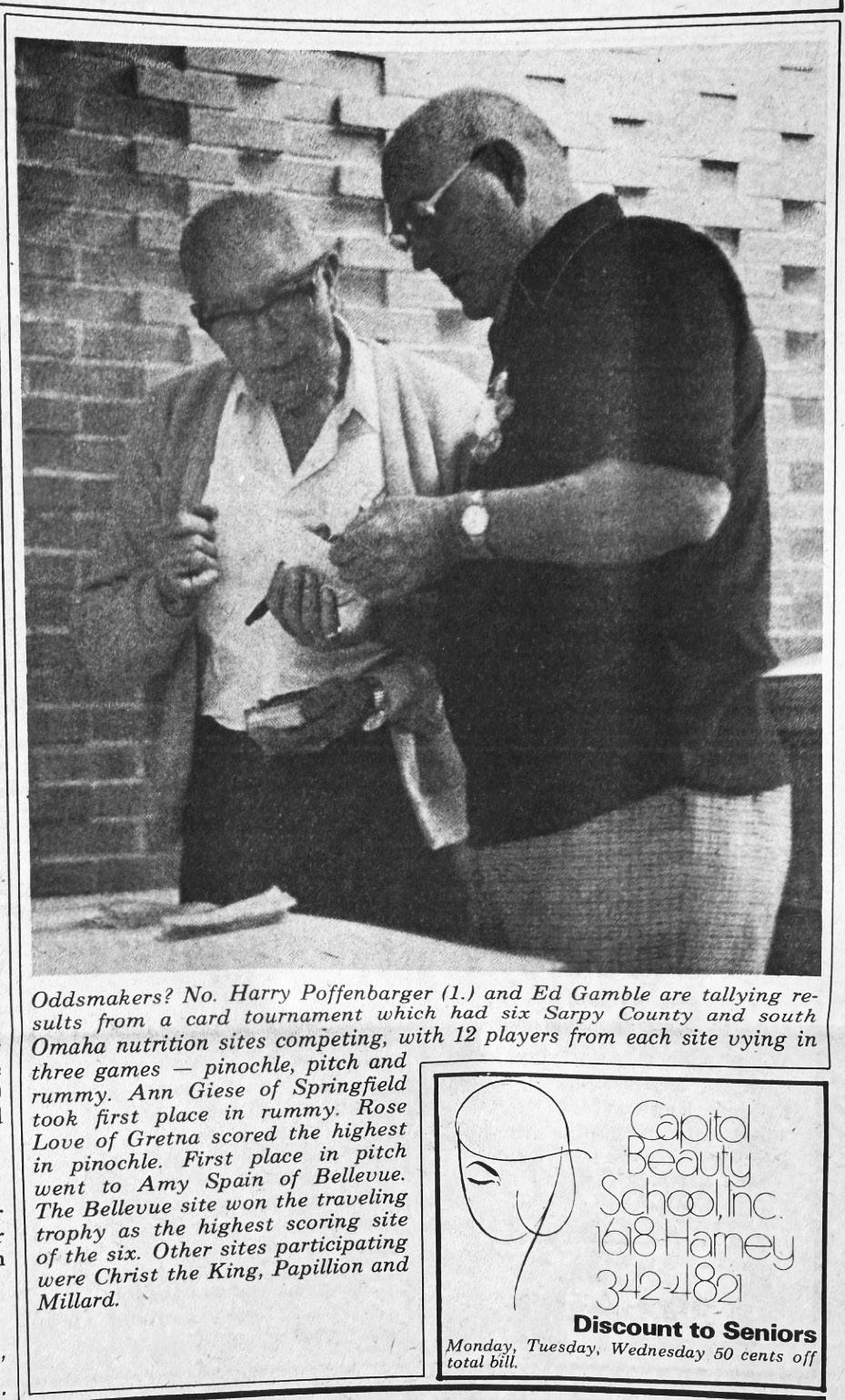
In the August of 1975 issue of the New Horizons, a picture features Harry Poffenbarger and Ed Gamble from a card tournament, which included pinochle, pitch and

It’s difficult to find nonpartisan interpretations of what’s in this bill. It’s difficult to see the misinformation that has been floating around that Medicare and Social Security are ending. Medicare and Social Security are not ending. This is a summary of various articles that touch on issues that affect senior citizens.
Some of you are working while others are retired, some own businesses, some are high net worth while others are on Medicaid, some have started collecting Social Security, and others are waiting to start collecting.
Prior to this Bill, if someone was participating in a Health Savings Account and continued to contribute to it past age 65, they would get a penalty.
Now they will be able to
continue to contribute to their HSA without penalty.
The deduction for tips is limited to $25,000 per year, while the deduction for overtime is limited to $12,500 per year ($25,000 if a joint return is filed).
Additionally, both deductions are phased out for workers with modified adjusted gross income more than $150,000 ($300,000 for a joint return.)
The Section 199A deduction for small businesses is expanded; and incentives are reinstated, such as 100% immediate expensing for machinery, equipment and R&D expenses and allowing full expensing for new factories (to encourage domestic manufacturing).
SOCIAL SECURITY
According to a press


release by Social Security: The bill ensures that nearly 90% of Social Security beneficiaries will no longer pay federal income taxes on their benefits, providing meaningful and immediate relief to seniors who have spent a lifetime contributing to our nation’s economy.
However, you are still going to see taxes come out of your Social Security check unless of course you request that they no longer take taxes out.
According to AARP, the targeted tax relief for older adults will come in the form of a $6,000 “bonus” deduction that could offset federal taxes on Social Security benefits for some. The full deduction is available to taxpayers age 65 and older with a modified gross adjusted income (MAGI) of up to $75,000 for an individual filer and $150,000 for a couple filing jointly. (Each spouse can take the deduction, for a total of $12,000, if both are 65-plus.)
The deduction is reduced for higher earners, up to $175,000 for a single filer and $250,000 for a couple. Above those thresholds, you don’t qualify.
You can claim this new deduction even if you otherwise itemize deductions on your tax return. If you don’t, you can add it to the existing standard deduction, which is already higher for taxpayers 65 and older.
But you’ll be able to do so only for the next four years

— the bonus deduction is set to expire in 2029.
This bill eliminates benefits for an estimated 1.4 million undocumented immigrants. To be eligible for Medicaid, there will be new “community engagement requirements” of at least 80 hours per month of work, education or service for able-bodied adults without dependents. One source said the new requirements would begin on Dec. 31, 2026. Another source says the new requirement would not kick in until Jan. 1, 2029. People would also have to verify their eligibility for the program twice a year, rather than just once. The resulting cut in Federal funding over 10 years is estimated to total $700 billion.
Starting in fiscal 2028, States would shoulder 5% of benefit costs, and 75% of the administrative costs. Currently, states pay none of the benefit and half of the administration costs. This bill expands the work requirements to receive food aid. Under current law, able-bodied adults without dependents must fulfill work requirements until they are 54, and that would change to age 64. (Also, some parents are currently exempt from work requirements until their children are 18; that would change so only those caring for a dependent child under the age of 7 are exempt.) The resulting cut in Federal funding over 10 years is estimated to total $267 billion.
The Tax Cuts and Jobs
Act that was passed in 2017 was scheduled to sunset at the end of 2025. This has been permanently extended and maintains the current top income tax rate of 37%. Increase in the standard deduction threshold. In addition to the $6,000 increase for seniors, there’s a $1000 increase for individuals and $2000 increase for married filing jointly. Auto loans for U.S. made vehicles allows for a tax deduction of up to $10,000 in interest, this expires in 2029.
The State and Local Tax (Salt) Deduction was raised from $10,000 to $40,000; and an increased estate tax exemption from $13.99 million to $15 million for individuals and from $27.98 to $30 million for those married filing jointly. Depending on your financial situation, everyone will interpret the changes that are coming differently. Stay healthy, stay strong, and stay informed from reliable sources on the subjects that matter the most to you. And remember that you don’t have to do this alone, reach out to trusted partners and experts in your areas of concern.
Mary Hiatt is a Retirement & Insurance Advisor and President of Mary the Medicare Lady (A nongovernment entity.) She is Certified in Long Term Care Programs, Policies, & Partnerships and Annuities. She offers Educational Workshops on Medicare, Long Term Care and more at no charge. She works with reputable estate planning Attorneys to help her clients get Medicaid. Not connected with or endorsed by the U.S. government or the federal Medicare program. Medicare Supplement insurance plans are not connected with or endorsed by the U.S. government or the federal Medicare program.
You’re invited to visit the Florence Senior Center, 2920 Bondesson St.
At the Florence Senior Center, lunch is served at 11:30 am. A select menu is offered Monday thru Friday. Meal reservations must be made one day in advance. Please call by noon the day before for a meal reservation.
The center hosts activites such as Tai Chi, annual picnics/ special events, bingo, cards, gym & game room access, special guest speakers and socials.
Arts and crafts will be held on the third Wednesday of each month. They also provide health and nutrition programs.
For more information, please call Colleen Metz @ 402444-6333.
By William E. Seidler, Jr. SEIDLER & SEIDLER, P.C. Attorneys-at-Law
The 2025 Nebraska Unicameral passed legislation solving an insurance problem with Transfer On Death Deeds (TODDs).
Nebraska adopted legislation creating TODDs for real estate in 2013. These deeds allow an Owner, who is referred to as the “Transferor,” to make a real estate deed that transfers ownership to a designated Beneficiary after the Owner’s death. This system allows ownership transferred recording a certified death certificate in the office of the Register of Deeds in the county where the real estate is located.
However, one problem existed because property insurance coverage on the property terminated immediately on the Owner’s death. If damage to the property occurred after the Owner’s death, but before the TODD Beneficiary could obtain new insurance coverage, the Beneficiary could suffer an uninsured loss.
The Nebraska Transfer on Death Deed Act is similar to legislation passed in more than 30 other states.

TODDs are simpler than revocable trusts. They can be used to accomplish the goal of avoiding probate in certain instances. After the Owner’s death, transfers are subject to inheritance tax and creditor’s claims. These deeds avoid problems of coownership in joint tenancy deeds.
The difficulty with TODDs and the termination of insurance coverage became real for a beneficiary in a case in Minnesota in which a house, subject to a TODD, burned after the Owner’s death, but before the beneficiary could obtain insurance coverage.
The Court ruled that the insurance company was not liable to pay for the damage, because the policy was the Owner’s, and not the beneficiary’s. That meant that the beneficiary did not have insurance to pay for the loss.
The Nebraska Unicameral has now corrected this problem in TODD law by amending the TODD statutes to provide that the
Beneficiary has temporary insurance coverage until the first of these events occurs: 30 days pass after the Transferor’s death; the Transferor’s policy expires; or the Beneficiary purchases a replacement insurance policy.
The new legislation states that nothing in the TODD Act affects coverage provided under an insurance policy to household members or others who are deemed to be insured upon the death of the Owner.
After September 2, all TODDs must contain the following warning: Property insurance on the transferred property may expire thirty days after the death of the Transferor.
Unless the Transferor has added the designated Beneficiary as an insured or additional named insured to the property insurance policy of the transferred property, any property insurance coverage of the transferred property will end on the earliest to occur of the following after the Transferor’s death: The end of the policy period as determined as if the Transferor was still living; the date the designated Beneficiary obtains
Sure, you know that “Walking is good for you.” But what does that really mean? The research is in, and some of the benefits of walking might surprise you. Start taking steps to move more and reap the harvest of good health that a consistent effort to walk more will bring you. Great news. Whether you break your walking into several shorter events across the day or love to take a long walk on a longer pier, moving more can have great impact on your overall health.
Weight Management: Combined with healthy eating, physical activity is key to any plan for long-lasting weight control. Keeping your weight within healthy limits can lower your risks of type 2 diabetes, heart disease, stroke, cancer, sleep apnea, and osteoarthritis.
Control Blood Pressure:
Physical activity strengthens the heart so it can pump more blood with less effort and with less pressure on the arteries. Staying fit is just as effective as some medications in keeping down blood pressure levels.
Decrease Risk of Heart Attack: Exercise such as brisk walking for three hours a week — or just half an hour a day — is associated with a 30% to 40% lower risk of heart disease in women.
Boost “Healthy” Cholesterol: The level of highdensity lipoproteins (HDL). Physical activity helps reduce low-density lipoproteins (LDL or “lousy” cholesterol) in the blood, which can cause plaque buildup along the artery walls — a major cause of heart attacks and strokes.
Lower Stroke Risk: Regular, moderate exercise equivalent to brisk walking for an hour a day, five days
alternative coverage; or thirty days after the Transferor’s death only if any premium required for the additional days beyond the policy period is paid.
The new law will make the transaction with TODD transfers easier and give the Beneficiary time to obtain appropriate insurance
coverage.
The information contained in this article is general information. Slight changes in individual situations may require material variance in the applicable advice. You should not attempt to solve individual problems based on the advice in this article.

a week, can cut the risk of stroke in half, according to a Harvard study.
Reduce Risk of Breast Cancer & Type 2 Diabetes: People at high risk of diabetes cut their risk in half by combining consistent exercise like walking with lower fat intake and a 5% to 7% weight loss.
Additional Benefits:
• Helps prevent anxiety, depression, colon cancer, constipation, osteoporosis
• Lowers stress levels and relieves arthritis and back pain
• Strengthens muscles, bones, and joints and improves sleep
• Elevates overall mood and sense of well-being
• Helps curb nicotine cravings
Submitted by Karen Rehm, worksite wellness specialist. To contact Karen at 402-483-1077 or send an email to krehm36@gmail. com.

The best time to prepare for future needs is before they arise — particularly when it comes to caregiving. After all, who has time to hunt for buried paperwork or create legal documents in an emergency? But with well-organized health and financial records, seniors and caregivers can be better equipped to face the unexpected.
It’s not about organization for organization’s sake. With the proper documentation in place, caregivers can help ensure their loved one’s wishes are honored, preferences are known, and finances are protected.
Having medical and financial power of attorney documents at hand allows caregivers to make critical decisions without delay. This can also help families avoid confusion and disagreements in tense times, like waiting for a parent to come out of a critical surgery or other emergency situation.
Of course, the goal is not for caregivers to take control away from the person
they’re supporting. It’s about empowering caregivers to make decisions on a senior’s behalf if and when they’re unable to do so.
For seniors, getting your affairs in order now is a loving thing to do, as it can reduce a tremendous amount of stress in an already challenging time for your family. It can simplify the task of managing your affairs and provide peace of mind for everyone involved.
If you need help organizing paperwork for seniors, try these tips:
• Use a caregiver app. If you’re most comfortable managing files from your phone, a caregiver app is a great way to get organized. With a free app like Caring Village, for example, multiple family members and caregivers can stay connected and informed about a loved one’s care.
You can upload important documents and access them anywhere, share to-do lists to delegate responsibilities to other people who want to help, and complete checklists to assist you in preparing for emergencies.


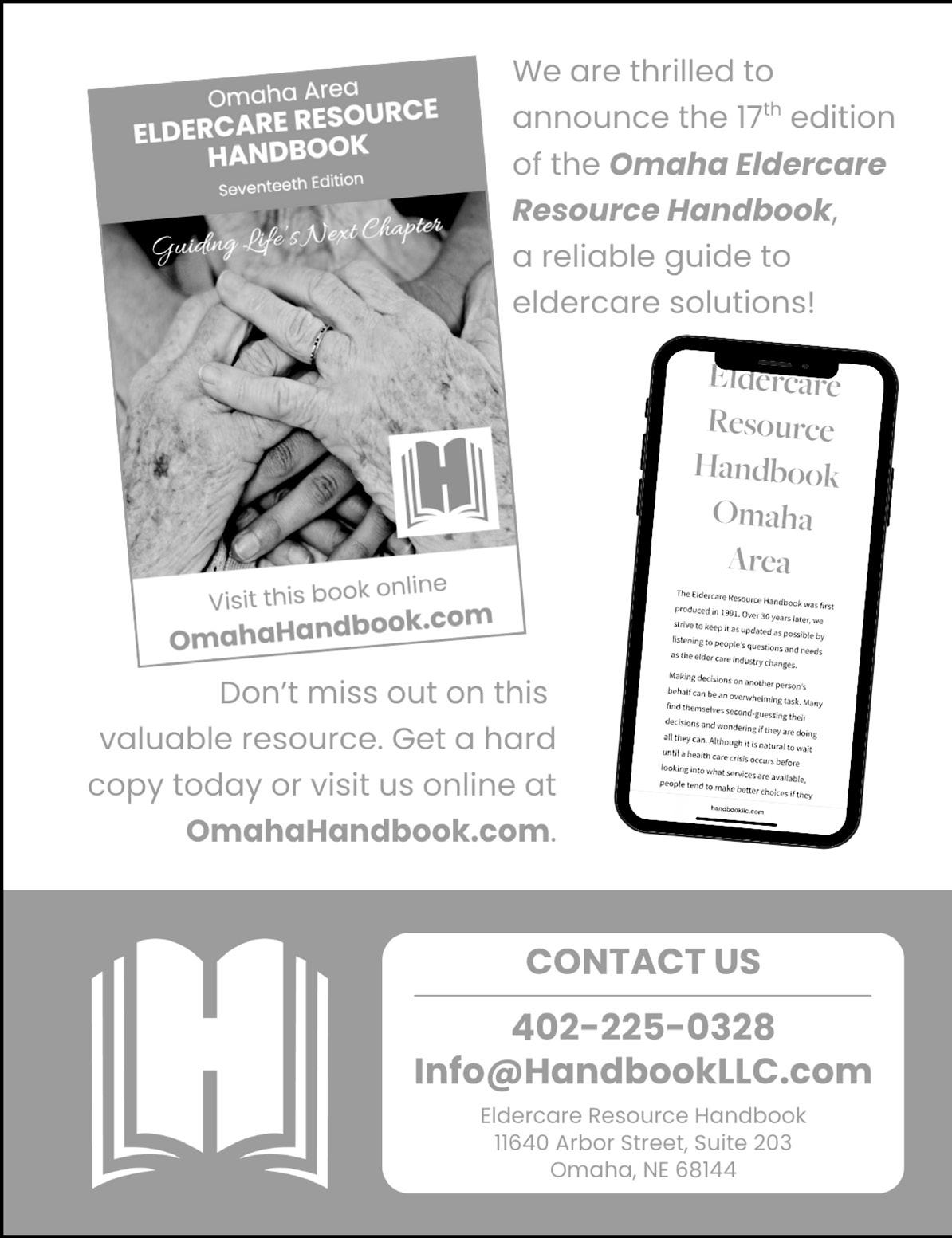
• Create a caregiving binder. For those who prefer paper — or who want a backup to a digital system — a caregiving binder is an excellent solution.
You can get a physical binder and divide it into sections such as medical documents, financial documents and proof of identity.
The Senior Alliance offers a range of free customizable templates to help you create a personalized caregiving binder.
3. Make digital backups. For added security and easy access, scan important physical documents and store them in a cloudbased service like Dropbox, Google Drive or Notion.
For extra-sensitive information, consider encrypting files with a service like Cryptomator before uploading them to the cloud.
• Protect the originals. For critical legal documents like wills, powers of attorney and property deeds, store the originals in a locked safe that’s fireproof and waterproof. Keep copies in your caregiving binder or the cloud.
• Grant access. Ensure that trusted family members know where to find essential documents in case of emergency, and give them the passwords or physical keys they need to access that paperwork.
• Schedule regular updates. Review and update important documents annually or after a significant life event, such as a change in residence or health status. Discard things like outdated insurance policies and tax returns older than seven years.
CHECKLIST OF
Wondering which documents you need to include in your caregiving binder or digital storage solution?
Use this checklist, which covers three categories of documentation: medical, financial and proof of identity.
Essential medical documents:
• HIPAA authorization. Seniors can complete a simple HIPAA release form that allows their doctor to share details about their health and billing records with trusted caregivers.
• Medical power of attorney (aka healthcare proxy). This legal document enables seniors to appoint a family member or friend to make medical treatment decisions on their behalf.
• Living will. This advance care directive outlines a senior’s medical preferences (such as the desire for CPR or life support) if they can no longer communicate.
Other important medical documents to keep on file:
• List of current physicians and diagnoses
• List of current medications
• Medical history
• Health insurance card
• Long-term disability insurance policy
• Long-term care insurance policy
Essential financial documents:
• Financial power of attorney.
This legal document gives caregivers the authority to make monetary and property decisions on behalf of their loved one.
• Last will and testament.
This document specifies how your loved one would like their assets to be distributed after they pass away.
• Trust documents. Seniors may choose to place assets within a trust, which is then managed by a third party on behalf of the beneficiaries.
• Life insurance policies. These typically pay a lump sum to designated beneficiaries upon the policyholder’s death.
Other important financial documents to keep on file:
• List of bank accounts and account information
• Pension documents and 401(k) statements
• Savings bonds and stock certificates
• Social Security information
• Recent tax returns
• Property deeds and mortgage papers
• Vehicle titles
• Home and auto insurance policies
• Bills and recurring payments
Essential identification documents. Keep copies of the following documents for proof of identity:
• Driver’s license or valid state identification
• Social Security card
• Passport or citizenship papers
• Birth certificate
• Marriage and/or divorce papers
• Military discharge papers
A Word from ArchWell Health: Wherever you are on the memory loss journey, you are not alone. The compassionate team at ArchWell Health is always ready to assist caregivers and older adults with their primary care needs.
By Tony Harris AARP NE Information Center
This year marks the 90th anniversary of Social Security — one of the most significant achievements in our nation’s history. For generations, Social Security has provided a foundation of financial stability for millions of Americans, including currently more than 370,000 individuals and their families right here in Nebraska.

On August 20 at 1:30 p.m., anyone is invited to attend the AARP Nebraska Information Center’s monthly program, where the The AARP Nebraska Information Center will be celebrating the 90th anniversary of Social Security. All are welcome to attend this celebration that will include refreshments and prizes. At 90 years strong — celebrate Social Security together.
Located at 1941 S 42nd St. in suite 220, the Information Center is open on Tuesdays, Wednesdays and Thursdays from 10 a.m. until 4 p.m.
If you are interested in becoming more involved, stop by the Information Center to learn more about the many opportunities to get involved in the community by becoming an AARP Nebraska volunteer.
For more information call the Information Center at 402-916-9309.
Join Flaherty Senior Consulting for a series of Solutions Group gatherings that will address the questions and challenges caregivers face.
Solutions Groups provide opportunities for caregivers to learn how to deal with various issues, obtain skills and knowledge, engage in discussions, and interact with others in similar circumstances.
Upcoming meeting dates and locations are:
• Aug. 7, Oct. 2, Dec. 4
The Servite Center of Compassion 72nd St. and Ames Cr.
• Aug. 20, Oct. 15, Dec. 17
St. Timothy Lutheran Church 93rd and Dodge streets
• Sept. 9, Nov. 11
St. Vincent de Paul Church 14330 Eagle Run Dr.
• Sept. 27, Nov. 29 Faith Westwood United Methodist Church 4814 Oaks Ln.
The Solutions Groups are facilitated by Nancy Flaherty, MS, CDP, president of Flaherty Senior Consulting. She has extensive experience working with family caregivers and caregiver groups.
For more information, email Nancy at flahertyconsulting@cox.net or call/text her at 402-312-9324.
You’re invited to visit the Intercultural Senior Center (ISC), 5545 Center St.
The Intercultural Senior Center facility – open weekdays from 8 a.m. to 4:30 p.m. – offers programs and activities Monday to Friday.
The ISC offers a morning snack, and regular or vegetarian lunch.
Come and exercise at the ISC. It’s never too late to learn and have fun. Join their language classes, technology, jewelry and crafts, and field trip options.
Lunch reservations are due by 9 a.m. A voluntary contribution is suggested for the meal.
Monthly food pantries are available for adults ages 50 and older.
For more information, please call 402-444-6529 or visit the ISC website at interculturalseniorcenter.org.
Legal Aid of Nebraska operates a free telephone access line for Nebraskans ages 60 and older.
Information is offered to help the state’s older men and women with questions on topics like bankruptcy, Homestead Exemptions, powers of attorney, Medicare, Medicaid, and Section 8 housing.
The number for the Elder Access Line is 402-827-5656 in Omaha and 1-800-527-7249 statewide.
This service is available to Nebraskans ages 60 and older regardless of income, race, or ethnicity.
The Legal Aid of Nebraska hours of operation are 9 a.m. to noon and 1 to 3 p.m. Monday through Thursday, and 9 a.m. to noon on Friday.
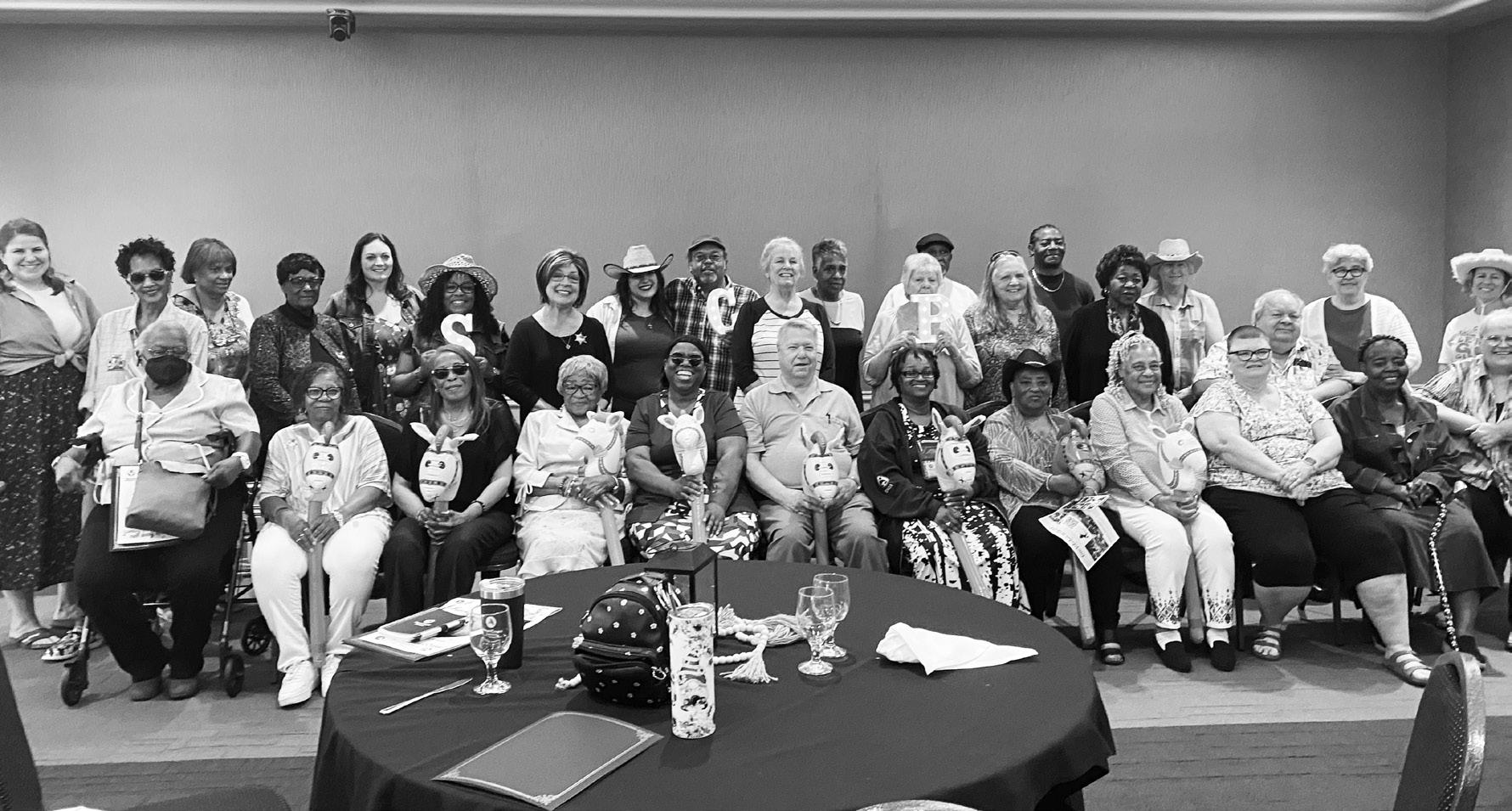
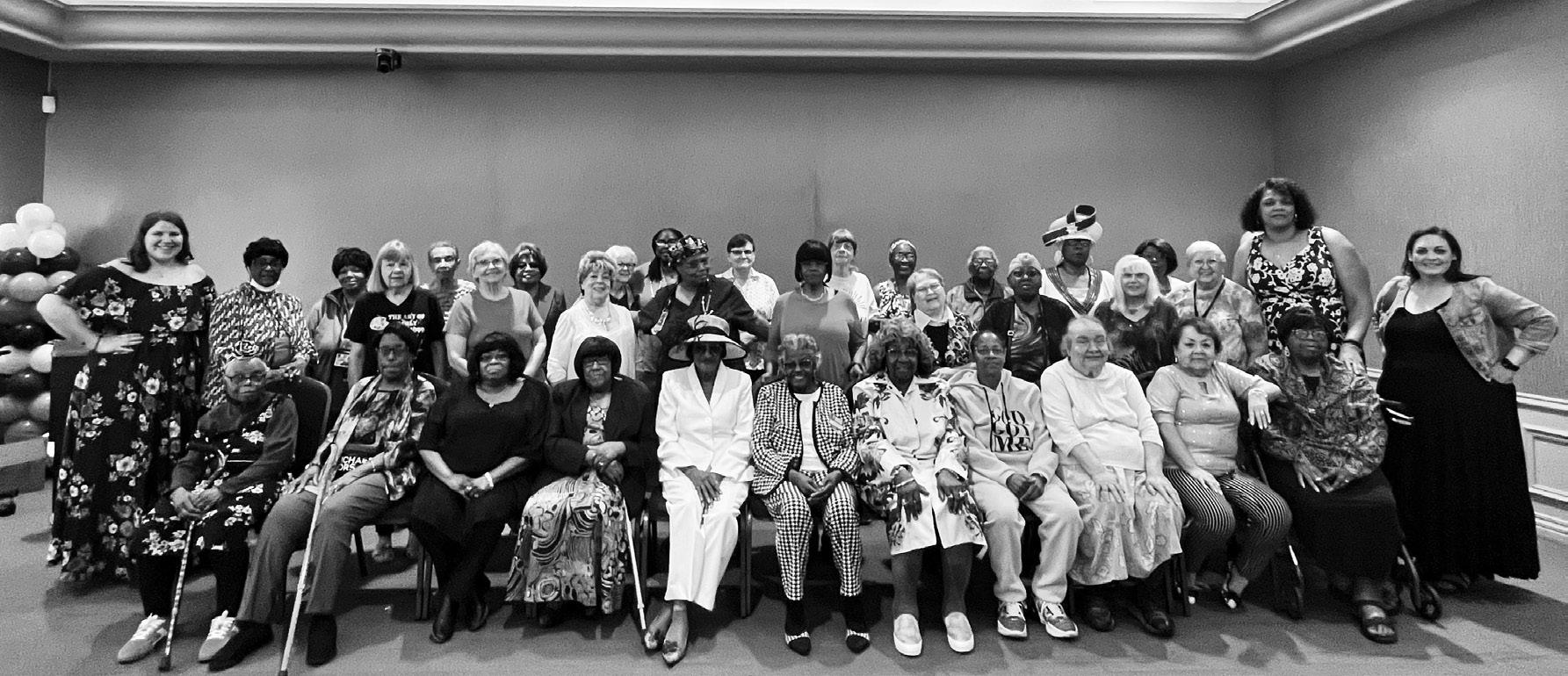
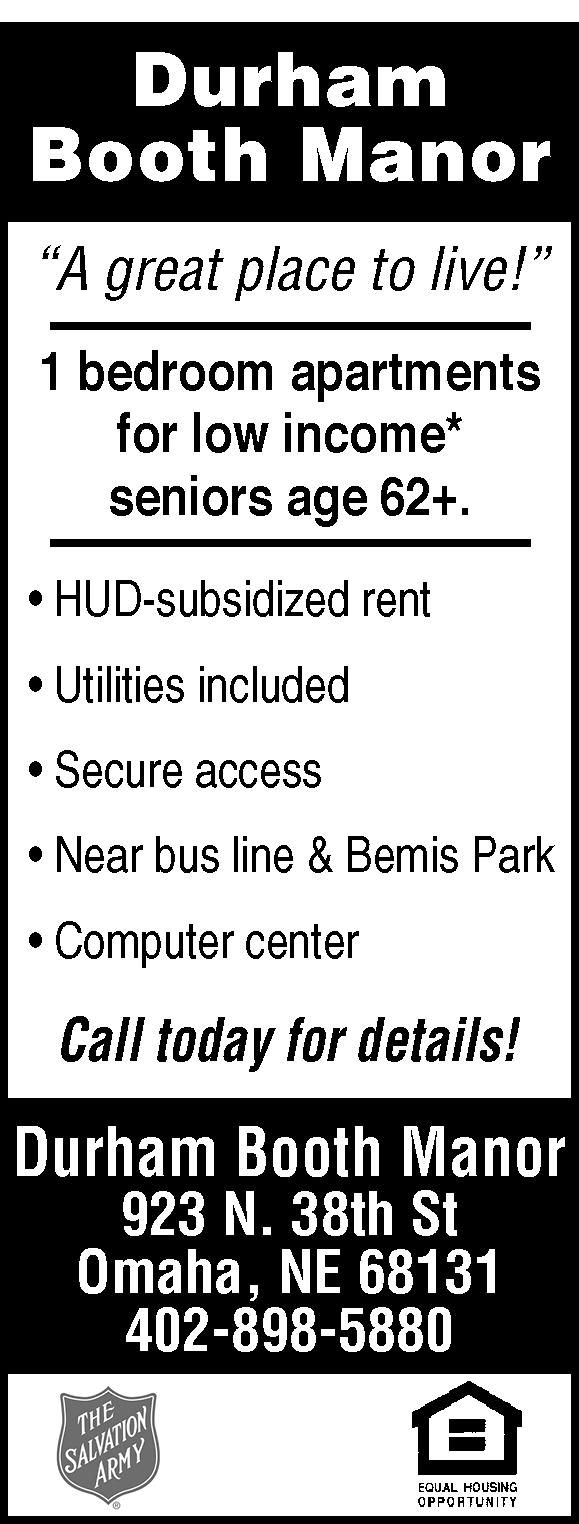




By Ron Petersen
Age is just a number. When it comes to modeling and acting, the statement holds true when it comes to doing the things people have a passion for, even as they mature.
“I just thoroughly enjoy modeling, and I feel very alive,” Omaha native, Wendy Fetters said. “I feel like I am being productive when I am modeling and acting. I feel young, and I enjoy wearing different clothes.”
Wendy Fetters first got into modeling in the mid-1980s, when she got involved with a local mod-

Wendy Fetters and other local women, both model and act around the Omahae metro area. Their experience and life stories can be valuable assets to the entertainment industry.
eling agency, who sent her to different photoshoots.
Fetters also had an extensive acting career, playing extras in multiple films and commercials around the country. She also plays the grandmother in The Nutcracker, which is played at the Orpheum Theater in Omaha.
“I played an extra in Alexander Payne’s ‘Downsizing.’ And in the early 2000s I was able to be in a Boys Town hearing aid commercial, which ran for three years,” Fetters said. “I got busy doing commercials for Oriental Trading Company and then I did fashion shows and modeled for Younkers. I just embrace every oppor-
tunity that came along and remained active.”
While launching her modeling and acting career, Fetters was working in other career fields including education and communications. Fetters also made sure she was present for her family as she helped support her daughter and grandchildren.
“I love modeling and acting, so I kept myself really busy, but I also was able to be there for my daughter,” Fetters said. “Family is very important to me.”
These days, Fetters continues to stay busy by auditioning for everything

that comes her way.
“I audition for things that come along because that is what a model and a performer would do,” she said.
Another local model and actress, Mary Wolford, got into acting in 1998 in Arizona, and have made stops in New York and Iowa before making it to Omaha.
“It was pretty neat being a stand-in in ‘The Bourne Ultimatum’ and ‘Made of Honor,” Mary Wolford said. “I was also in the final episode of ‘The Sopranos.’ ”
Wolford has one photoshoot under her belt, but spent most of her time on screen, which is where she belongs.
“It comes naturally for me,” Wolford said. “I’ve never been a bashful person in front of the camera because I enjoy acting.”
Wolford had a busy year in 2024 and it’s only going to get busier with what she has coming up in the future.
“This last year, I did a photoshoot for a casino in Lincoln, along with doing work for The Maids and South Dakota Social Services,” she said.
Getting into modeling and acting, may be a challenge, but it all starts with getting an agent and having confidence.
“Clients want to see you in your natural element, and they want you to be yourself. But, some people just have a certain look,” Wolford said. “Taking care of yourself physically is very important. For whatever role you will be playing, you need to be ready.”
Fetters and Wolford both enjoy modeling and acting because they were forced out of their comfort zone, by putting themselves out there and trying to get a part in every audition that came available.






“My advice is that you really have to get out of your comfort zone if you ever want to find a passion. You cannot be afraid to find your joy. You have to jump in and try it,” Fetters said. “Life is so short — living life without regrets is the biggest joy in the world. If something brings you joy, then you should explore it a little more deeply with whatever your passion is. I just want people to find their passion.”